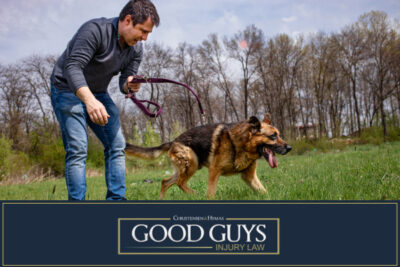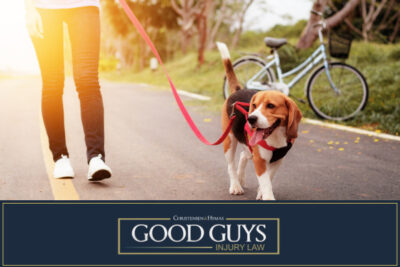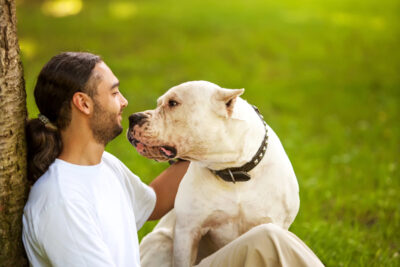Table of Contents
Understanding Dog Behavior and Safety
Knowing a dog’s behavior is the first step in preventing dog bites. Dogs communicate through body language, and knowing what they are trying to say can prevent misunderstandings. A happy dog looks much different than a scared or aggressive dog. Recognizing these differences helps prevent negative interactions.
Dogs need space just like people do. Not all dogs want to be petted or approached by strangers. Reading a dog’s signals and respecting their space can greatly reduce the risk of dog bites. It’s all about creating a positive environment for both dogs and people.
Recognizing Warning Signs of Aggression

- Growling or snarling: If a dog is growling or showing its teeth, it’s a clear sign of discomfort or aggression. Give the dog space and avoid making eye contact.
- Rigid body posture: A dog that suddenly stiffens up might feel threatened. This is a signal to back off.
- Ears pinned back: When a dog’s ears are pinned back against its head, it’s often a sign of fear or aggression. Proceed with caution.
- Avoiding eye contact: A dog that refuses to make eye contact and turns its head away might be trying to de-escalate a tense situation.
- Raised hackles: The hair along a dog’s back standing up can indicate fear or aggression. This is a sign that the dog is very uncomfortable.
- Tail tucking: A tucked tail is a sign of fear. A scared dog can bite if it feels it has no other option.
- Licking lips or yawning: These can be signs of stress in dogs. If you notice these behaviors, give the dog some space.
Importance of Socialization and Training for Dogs
Socializing dogs from a young age is necessary to prevent aggressive behavior. Dogs that are comfortable around people and other dogs are less likely to react negatively in unfamiliar situations. Training also plays a key role in teaching dogs how to behave properly. Basic commands can help control a dog in potentially dangerous situations.
Continued socialization and training throughout a dog’s life keep them well-adjusted and manageable. Positive reinforcement techniques strengthen the bond between dogs and their owners. This bond makes it easier to manage dogs in situations that could lead to bites. Well-socialized and trained dogs are a joy to be around and pose less risk to the community.
Effective Communication with Dogs
Communicating effectively with dogs involves knowing and respecting their body language. Always approach dogs calmly and confidently. Avoid direct eye contact and let them come to you. This shows the dog you are friendly and not a threat.
Approaching Dogs Safely
Never approach a dog without asking the owner’s permission first. Let the dog sniff your hand before you try to pet it. Pet the dog under the chin or on the chest, not on the top of the head. These actions help prevent fear and aggression, reducing the risk of dog bites.
Teach Children How to Interact with Dogs
Teaching children the proper way to approach and interact with dogs is important. Explain to them that not all dogs want to be touched and that they should always ask before approaching a dog. Show them how to pet a dog and gently avoid rough play. Being aware of how to interact safely with dogs can prevent bites and foster a lifelong love and respect for animals.
Preventing Dog Bites in Public and Private Spaces

- Use leashes in public: Always keep your dog on a leash in public spaces. This helps you maintain control over your dog and prevent unexpected interactions.
- Secure your dog at home: Use baby gates or keep your dog in a secure area when visitors come. This prevents your dog from feeling overwhelmed and acting out.
- Educate visitors: Explain to visitors how to interact safely with your dog. Provide clear instructions to prevent misunderstandings.
- Monitor playtime with other dogs: Keep an eye on your dog when it’s playing with other dogs. Step in if play becomes too rough or if any dog seems uncomfortable.
- Be aware of your surroundings: When walking your dog, be aware of your surroundings and avoid approaching unfamiliar dogs without the owner’s permission.
Leash Laws and Dog Control in Salt Lake City
Salt Lake City has specific leash laws to ensure the safety of both dogs and residents. Dogs must always be on a six-foot leash in public spaces unless they are in a designated off-leash area. These laws help prevent dog attacks and protect dogs from getting lost or injured. All dog owners need to follow these rules to maintain a safe community.
There may be legal implications for both the dog owner and the victim in dog bite cases. In Salt Lake County and Utah in general, dog owners can be held liable for damages resulting from their dog’s actions.
Safe Practices for Dog Owners and the Public
- Obey local leash laws: Always use a leash in public areas to control your dog and prevent it from wandering off or approaching strangers unexpectedly.
- Use a muzzle if necessary: If your dog has a history of aggression, consider using a muzzle in public to protect both your dog and others.
- Never leave dogs unsupervised with children: Even the most trusted dog can react unexpectedly. Always supervise interactions between dogs and young children.
- Train your dog to respond to basic commands: Commands like “stay,” “come,” and “leave it” can prevent potentially dangerous situations.
- Keep your dog’s vaccinations up to date: This protects not only your dog but also other dogs and people it may come into contact with.
- Report stray or unsupervised dogs to animal control: This helps prevent dog bites and protects the stray dog from harm.
- Be cautious around unknown dogs: Do not approach, touch, or feed dogs without the owner’s permission, especially if the dog is behind a fence or in a car.
Role of Pet Owners in Preventing Dog Bites

Dog owners should do everything they can to prevent dog bites. By having awareness of their dog’s behavior and providing proper training and socialization, owners can greatly reduce the risk of their dog biting someone. It’s also the owner’s responsibility to ensure their dog is secure in their home and yard, preventing any chance of the dog escaping and causing harm.
Ensuring your dog is well-socialized, trained, and happy is a big part of responsible dog ownership. Regular exercise and mental stimulation keep dogs healthy and less likely to exhibit aggressive behavior. To avoid potential dog bites, owners should always be mindful of their dog’s comfort and stress levels, especially in new or crowded environments.
Choosing the Right Dog for Your Lifestyle
Not every dog breed is suitable for every lifestyle. When choosing a dog, consider your living situation, activity level, and experience with dogs. Research different breeds to understand their needs and temperament. Choosing a dog that fits well with your lifestyle helps ensure a harmonious relationship and reduces the risk of behavior issues that could lead to dog bites.
Consider factors like the dog’s energy level, size, and compatibility with children or other pets. Consulting with breeders, shelters, and veterinarians can provide valuable insight into making the best choice. A well-matched dog and owner are less likely to encounter situations that could result in a dog bite.
Consider Professional Training for Your Dog
Professional training can be a valuable investment in preventing dog bites. Trainers can help address any behavior issues and teach your dog how to behave appropriately in various situations. Training classes also provide an excellent opportunity for socialization with other dogs and people.
Ongoing training and reinforcement of positive behaviors are key to preventing dog bites. Even well-behaved dogs can benefit from regular training refreshers. Professional trainers can offer tailored advice and strategies to ensure your dog remains a well-mannered community member.
What to Do If a Dog Bite Occurs
- Clean the wound: Immediately wash the wound with soap and water. This should reduce the risk of infection.
- Seek medical attention: Even if the bite seems small, get medical care to prevent infections and properly assess the injury.
- Report the incident: Notify local animal control about the bite. Reporting is needed for public safety and may help prevent future bites.
- Exchange information: If possible, get contact information from the dog owner and any witnesses. This will be important for medical and legal follow-up.
- Document everything: Record images or videos of your injuries and the location where the bite occurred. Keep records of medical treatments and expenses.
- Follow-up: Make sure to follow through with any recommended medical treatments or vaccinations.
- Consult a lawyer: If you face huge medical expenses or have suffered serious injuries, reach out to our team.
When to Seek Legal Advice
Seeking legal advice after a dog bite is important, especially if the injury is severe or if navigating the legal complexities seems overwhelming. A lawyer can help you assess your options and assist in recovering costs for medical expenses and other damages.
Good Guys Injury Law specializes in such incidents and can support you. We will handle negotiations with the dog owner’s insurance company or legal representation to secure a fair and just settlement on your behalf.
Being aware of your legal options early on will positively affect your case. If necessary, we can negotiate with insurance companies, collect evidence, and advocate for you in legal proceedings. This professional support ensures you’re not facing the aftermath of a dog bite alone.
How Good Guys Injury Law Can Assist in Dog Bite Cases
Good Guys Injury Law understands the physical and emotional toll a dog bite can have on a person. Our law office provides legal support throughout the process. We help victims understand their rights and strive to recover fair compensation for their dog bite injuries.
We handle all aspects of dog bite cases, from investigating the incident to negotiating with insurance companies. Our goal is to relieve the stress on the bite victim by managing the legal complexities and securing the compensation needed. Trust us to advocate for you and fight for the justice you deserve.
Let Our Salt Lake City Dog Bite Lawyer Fight for You After a Dog Bite

If you’ve suffered a dog bite, you don’t have to navigate the aftermath alone. Our Salt Lake City dog bite lawyer has the knowledge and resources to take on your case. Contact us today for a free case consultation.
